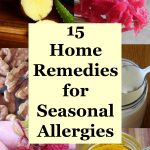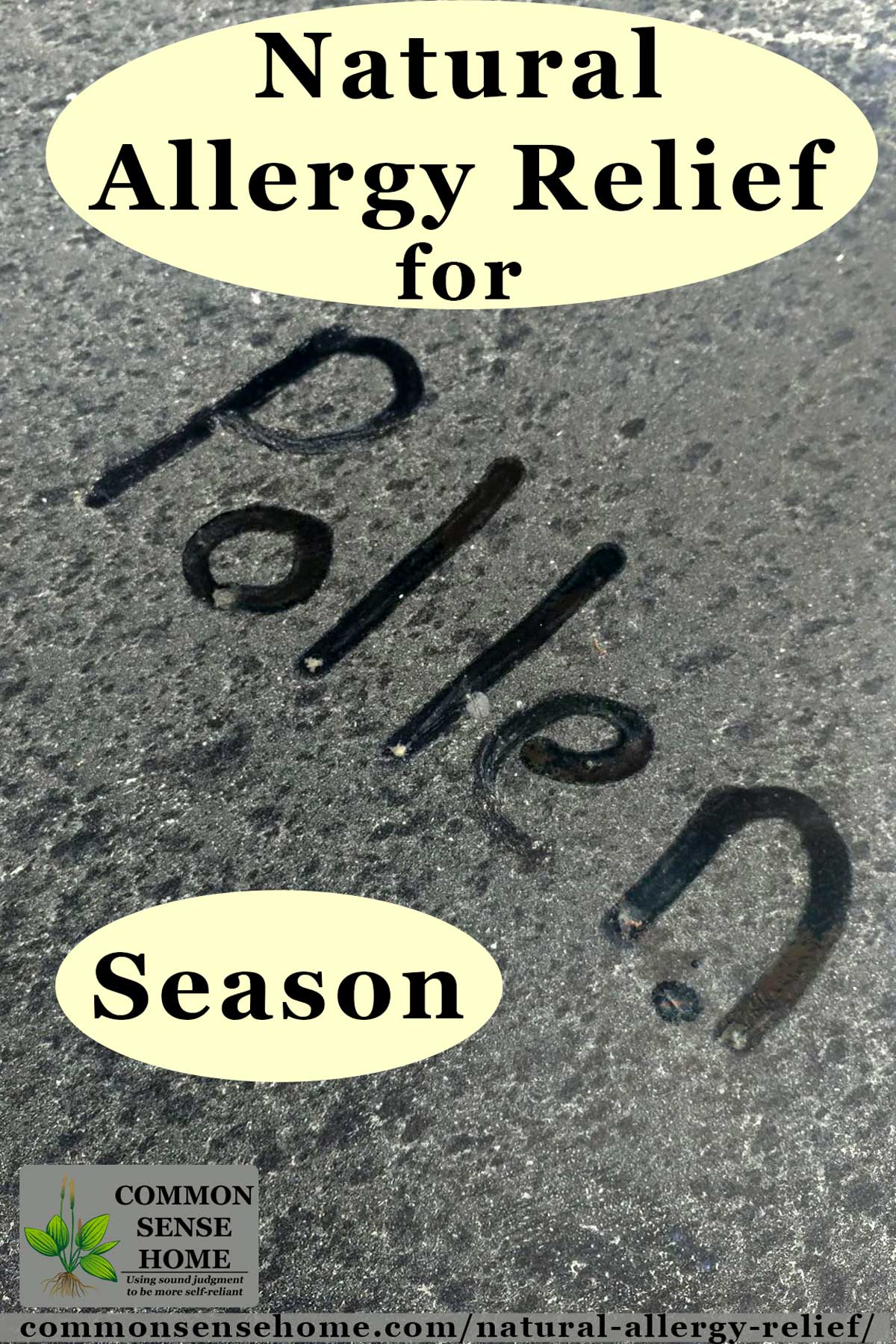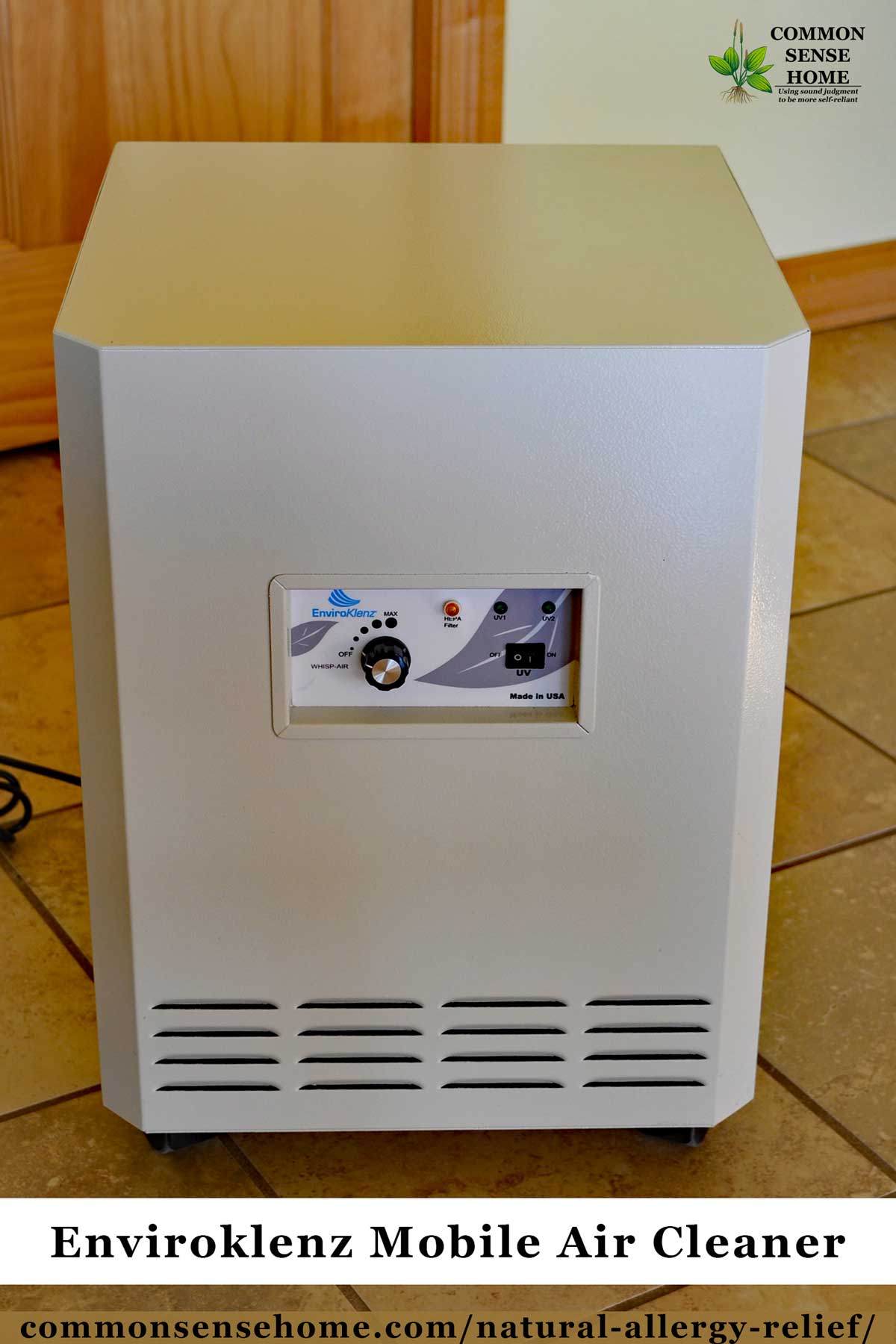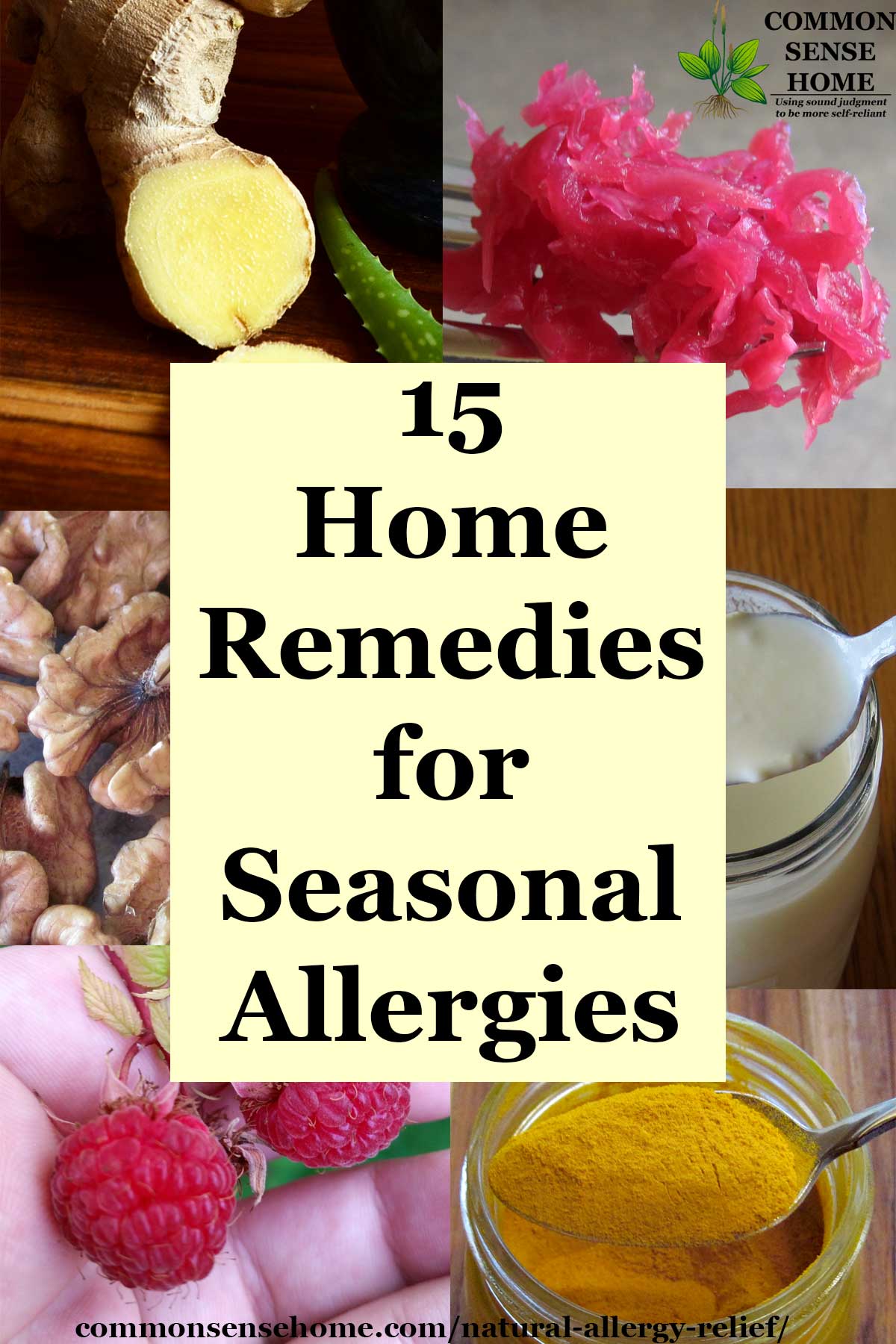Natural Allergy Relief – 15 Home Remedies for Seasonal Allergies
This post may contain affiliate links. Read my full disclosure here.
Want natural allergy relief without relying on pharmaceuticals? We’re sharing home remedies for seasonal allergy symptoms like runny nose and sore throat. We’ll talk about DIY essential oil blends, pollen busters, herbs, supplements, foods that reduce allergy symptoms and foods that may make allergies worse.
What Causes Seasonal Allergy Symptoms?
Seasonal allergies are also known as hay fever or allergic rhinitis. When mold spore and pollen counts go up, your immune system releases histamines.
Histamines are naturally occurring and perfectly normal – except when your body over-reacts to non-harmful substances. Then you end up with itchy, watery eyes; runny nose and/or sinus drainage; sore or scratchy throat; and chest tightness, cough or difficulty breathing.
If you’re faced with real toxic substances, this reaction helps keep them out of your body. Unfortunately, many of us now have immune systems gone haywire, with more than 50 million Americans suffering from some sort of allergy.
When is Allergy Season?
Spring and fall tend to be the worst times, with tree pollen peaking in spring and perennial plants like ragweed peaking in fall. Mold spores show up year round, but are more abundant in wet conditions.
Natural Allergy Relief Options
Natural allergy relief options work to calm down your immune system, boost natural healing and eliminate triggers. They don’t have the harsh side effects of pharmaceuticals. Some of them include:
- Honey and Pollen
- Vitamin C
- Stinging Nettles
- Herbal Remedies
- Aromatherapy and Essential Oils
- Neti Pot
- Keeping pollen out of your home
- Spices
- Reishi mushrooms
- Omega 3 Fatty Acids
- Avoiding foods that can make allergy symptoms worse
- Fermented Foods and Probiotics
- Flavonoids
- Drink Plenty of Water
- Apple Cider Vinegar
#1 – Honey and Pollen
Raw local honey is a wonderful natural allergy relief option for many people. Dosing recommendations range from teaspoons to tablespoons per day, once dose to three or more doses. Try different amounts and see what works for you.
Bee pollen may help, too. Always looks for local sources for best results.
#2 – Vitamin C
Vitamin C is a natural antihistamine, antioxidant and antitoxin. To use it to fight hay fever symptoms:
- Take 1,000 milligrams five times a day for four to five days during acute flare-ups.
- Follow this with 1,000 milligrams three times a day for three weeks.
- Then take 1,000 milligrams a day for two months.
Some people with allergies find mineral ascorbate vitamin C or esterified vitamin C (Ester-C) easier to tolerate than simple ascorbic acid.
Some of the best food sources of vitamin C are citrus fruits like oranges, grapefruit and lemons; papaya, bell peppers, broccoli and other cruciferous vegetables (sauerkraut and kimchi are great!), strawberries, pineapples, kiwifruit and cantaloupe.
#3 – Stinging Nettle
Nettles are a natural antihistamine. Try nettle tea or nettle capsules leading up to and continuing through allergy season.
Learn more about nettles in Stinging Nettle – One of Most Useful Wild Plants – Weekly Weeder #16.
#4 – Herbal Remedies
The Herbal Academy also recommends elderflower and goldenrod for seasonal allergy relief, in addition to nettle. Like nettle, elderflower tea can be consumed leading up to allergy season.
They explain that: “Goldenrod is an anticatarrhal, an herb which helps the body remove excess mucus. Goldenrod also contains high levels of the anti-inflammatory constituent quercetin, which, along with its astringent action, can help alleviate the symptoms of allergies. Goldenrod tea as a Neti pot sinus wash can provide instant relief (be sure to bring tea to room temperature before using!).”
You can learn more about herbalism with online courses from the Herbal Academy.
#5 – Aromatherapy and Essential Oils
Mint oils and heat from mint tea or inhaling mint steam help to relax airways and may make breathing easier.
Modern Essentials recommends the use of lavender, eucalyptus, rose or peppermint essential oils for natural allergy relief.
- For lavender and peppermint essential oil, dilute 1-3 drops of EO in 1 tablespoon of carrier oil. Apply to sinuses and bottoms of feet.
- For eucalyptus and rose essential oils, diffuse into the air or inhale oil applied to a tissue or cotton wick.
#6 – The Neti Pot
Use a neti pot or saline rinse bottle to rinse seasonal allergy irritants out of your sinuses.
Note: Make sure to use only purified water or saline solution in your neti pot. Although rare, some people have been infected with a brain eating amoeba via the nasal passages from contaminated tap water while using a neti pot.
#7 – Keep the Pollen Out of Your Home
One of the simplest home remedies for pollen allergies is to limiting your exposure to pollen. Try the following:
- Wash pollen out of your hair and off your skin after being outside. Eyes may be rinsed with cool water.
- Skip line drying of clothes and bedding, which may lead to pollen accumulating on the fabric.
- Wash your pets. If you have pets, washing them may help, too, as pollen and other allergens can get caught in their fur (animal dander may also contribute to allergy attacks).
- Get rid of carpet. Mop or vacuum frequently, and make sure your vacuum doesn’t recirculate the dust. (HEPA filters are our friend).
- Try an air filter. Portable air filters can clear out your most used living areas, while whole house filters work throughout your home. Make sure to clean or change filters regularly.
The Enviroklenz Mobile Air System has certified HEPA filtration and covers up to 1000 square feet. We received one to test this winter after dealing with a moldy batch of firewood, and it made a huge difference in the basement air quality. Before we got it, the mildew/moldy stuck around long after the wood was burned. Once the unit fired up, it de-stinkified the room in short order.
Would you like to save this?
Get an Enviroklenz Mobile unit here
#8 – Add Some Spice!
Pour on the spices and seasoning! Try turmeric, onions, garlic, ginger, horseradish, hot peppers, hot mustard – get spicy! If it’s strong enough to make you pay attention to the flavor, chances are it has compounds such as sulfur, quercetin and other anti-inflammatories.
Cinnamon and licorice root (most commonly used in teas) may also ease breathing.
#9 – Reishi Mushrooms
Studies have shown that reishi mushrooms (Ganoderma lucidum) are anti-inflammatory and antiallergic, making them a powerful herbal ally for natural allergy relief. They also act as a liver tonic, helping us to clear out toxins.
#10 – Omega 3 Fatty Acids
Omega 3 fatty acids are also naturally anti-inflammatory. Since allergic rhinitis is a form of inflammation, foods that reduce inflammation may help provide seasonal allergy relief.
Some of the best sources of omega 3s are:
- sardines
- salmon
- flax seeds
- walnuts
You can also find Omega 3s in other seafood and products from pastured animals.
#11 – Avoid Foods That Make Allergy Symptoms Worse
The following foods may contribute to excess mucus production, worsening allergy symptoms. (From the Holistic Herbal.)
- Dairy products, including goat’s milk and yogurt
- Grains, especially gluten rich ones
- Eggs
- Sugar
- Potatoes and other starchy root vegetables
- Deep fried foods, processed foods
#12 – Fermented Foods and Probiotics
What’s a “live culture food”? Live culture foods are those that are fermented, either using salt or a starter culture. This helps preserve them and creates a great assortment of tasty food options. Think kimchi and sauerkraut, yogurt and kefir, wines and fermented condiments.
These foods are easy to digest and loaded with nutrition. They also rebuild the beneficial bacteria in our guts, which helps promote healing and wellness.
If you’re not fermenting foods yet, many natural food groceries now carry live culture foods. (Read labels and watch out for excess sugars and artificial ingredients.)
Traditional Cooking School has great fermentation cheat sheet to make fermenting easy for everyone to try.

Have fussy eaters or nervous about fermenting? Try probiotic supplements as a source of healthy bacteria.
#13 – Flavinoids
The term flavonoids applies to over 6000 substances, many of which give plants their bright, beautiful colors. Flavonoids also enhance the effects of vitamin C.
Some of the best food sources of flavonoids include: apples, apricots, blueberries, pears, raspberries, strawberries, black beans, dark leafy greens, cabbage, onions, parsley, pinto beans, and tomatoes.
Think fresh, clean and less processed. Load up on the fruits and veggies, which are high in antioxidants and water. The brighter the color of foods, the better the odds of it being high in antioxidants.
For acute seasonal allergy symptoms, Dr. Lam, a physician physician specializing in nutritional and anti-aging medicine, recommends 600-6000mg of Quercetin (a flavonoid) in divided doses on a empty stomach.
#14 – Drink Plenty of Water
Drink ample water and eat foods that are loaded with water, such as fruits and veggies. Staying hydrated helps to thin secretions, making them easier to clear. It also helps your mucus membranes stayed hydrated, reducing that dry, scratchy feeling.
#15 – Apple Cider Vinegar (ACV)
Last but not least, let’s not forget our perennial favorite home remedy for just about everything – apple cider vinegar!
Mix 1 tablespoon apple cider vinegar, 1 tablespoon freshly squeezed lemon juice and 1/2 tablespoon raw honey. Drink three times a day.
Like many natural remedies, this option may take several weeks before you feel the full affects.
This post is provide for informational purposes only and is not intended to diagnose or treat any illness. Remember to use caution with all herbs and supplements, especially if you are nursing or pregnant or on any medication. Although rare, allergic reactions to supplements themselves can happen, as can interactions with medications.
What’s your preferred option for natural allergy relief?
Let me know if you recommend a home remedy for seasonal allergies that I missed.
You may also find useful:
Originally published in 2012, last updated in 2019.






I try to stay on Colloidal Silver for my allergies. I can tell when I forget it.
I am curious about Remedy 15, ACV. My gut handles honey quite well, and I regularly take honey with ACV diluted with 6 to 8 oz. water. Lemon juice straight up would definitely irritate my stomach lining. Is the remedy you described effective diluted, or would that neutralize its effect?
Dilution shouldn’t be an issue, especially if it helps it sit easier in your stomach.
My husband experiences severe seasonal allergies every Spring and Fall,which really makes it difficult for him to minister to the church and deliver sermons…he has severe allergies to dyes and preservatives and prescription drugs have caused extra problems…we were informed about homeopathic medicines and a company Native Remedies…we purchased the AllergiClear-M and it has been an answer to our prayers…also we used Muscus-Clear in the Winter when he got a cold and was congested and couldn’t get rid of the mucus…they have been a true relief for us…don’t know if anyone else uses homeopathic medicines but this company is great
Thanks, Donna. I’ve used some homeopathic remedies, but not many.
This sounds bonkers but i promise it works perfectly ,if you dont want to wake up with the horrible hayfever headache every morning buy a strong mustard and about an hour before you go to bed apply a small amount to the skin over your upper and lower sinus being very carefull not to get it in your eyes ,they will water badly for a few seconds but will stop and the mustard will dry to a crust quite quickly ,go to bed as normal and i promise you will not wake up with a headache .
Hi,what about allergy from perfumes,strong sprays that irritates your eyes and start running,sneezing and dry coughing?
While inconvenient, many fragrances are toxic and can cause serious damage with long term or high exposure, so an allergic reaction is normal and healthy as your body attempts to get them out of your system as quickly as possible. I avoid synthetic fragrances like the plague.
The article “Dangers of Synthetic Scents Include Cancer, Asthma, Kidney Damage and More” notes:
An excessive reaction may be an indication that your immune system is on high alert due to other underlying issues, such as an autoimmune disease, asthma, high stress levels, or other factors. It’s impossible for me to say for sure, but it may be something that you want to look into in more detail. Sorry I don’t have a “magic bullet”, but there are many possible factors in play.
BEST THING FOR SEASONAL ALLERGIES? WASH YOUR HAIR EVERY DAY.. POLLEN
COLLECTS IN YOUR HAIR ~
I found the salt water gargle works well, it is also an inexpensive method of a regular mouth wash after the cold has gone to keep it at bay. Thanks.
Hi Laurie,
I’ve been lurking for several weeks. I know my comment on this matter is late but it’s important. You’ve got to be very careful with Reishi mushrooms. I worked for US Customs for decades and one of the drugs that we worked hard to keep out of the country was Sibutramine. It’s used as a weight loss pill or in weight loss tea or weight loss coffee. It’s main ingredient comes from the Reishi mushroom. Just because it grows naturally, does not mean it’s 100% good for you. The active ingredient in the Reishi and Sibutramine contraindicates with high blood pressure meds and statins and causes heart attacks. At least that’s the way it was explained to me by the FDA director that worked with our unit.
Thanks for the safety warning. I would hope that people would check dosing instructions and contraindications before dosing willy-nilly, but it certainly can’t hurt to have more warnings here.
I might cause a ruckus by saying this, but sugar actually helps allergies and–if not–allergy symptoms. I noticed that when I have the horrible, nightmarish, allergy, itchy throat that sugar gets rid of it! I also noticed peppermint candy seems to be great for allergy itchy throat and cough, but worthless against cold virus cough. What does peppermint candy have in it besides peppermint oil? Sugar and red dye. Just last night, I woke up in the middle of the night with that allergy itchy throat and cough. I got some candy and sucked on it and it was gone! It doesn’t matter what kind of candy you use, so it’s not the red dye, either.
No ruckus caused as long as people are polite in sharing their experience. Peppermint is commonly used for sore throat, and I personally do find it helpful for cold sore throats, but each person is different. Hard candies effectively produce a syrup as you suck on them, which could coat and soothe the throat area. So, yes, in a way it is the sugar, but the effect could be duplicated with other substances if sugar is being avoided.
I didn’t know about all these methods. I’ve known the gut would create a huge allergy issue if out of sync. The flora in our intestines are kinda in charge of what we get in to our bodies as they break it down.
What research is there on honey for allergies? I read this article, http://www.slate.com/articles/health_and_science/medical_examiner/2015/05/local_honey_for_allergies_pollen_in_honey_cannot_desensitize_the_immune.html
..which explains that bees collect nectar to make honey (with only trace amounts of pollen, which is what people are allergic to). Therefore by eating honey, we’re basically only consuming nectar which is pointless. Is that right?
Well, I’m not “an associate professor of allergy and immunology” and that article does make some good points. That said, I have seen anecdotal evidence in more than one person that the local honey has helped. Placebo effect? I have no idea. Other possible theories include that the consumption of raw local honey with pollen desensitizes the immune system to pollen in general (even though the pollen in the honey is not a match for allergenic pollen). In spite of the professor’s statement that most people are not allergic to “pretty flowers”, I see bees in the yard all the time visiting not so pretty flowers – even ragweed. Homeopathy folks would probably argue that the trace amounts are more effective than massive amounts, but I’m not expert on that field of study.
Still another possible option is that the honey, even though it’s consumed orally, acts to reduce inflammation and shrink swelling of the inflamed sinus tissues – like it draws excess fluid from wounds. You can read more on that in the post “Honey as Medicine” – https://commonsensehome.com/honey-as-medicine/
So basically, I’m not sure why it helps, but it does seem to, at least in some people. At the very least, it should do no harm to try it, but I haven’t found any conclusive study results.
One would be hard pressed to find someone that had an allergy sheet as extensive as mine once was. They started after many bouts of antibiotics for tonsillitis and the polio vaccine as a young child. I am now in my 50’s. A s a teenager I was tested for just about everything and came back positive for breathing. 🙁 Especially mold, dust and ragweed. BTW if you have a ragweed allergy never use echinacea for the flue season, as they are related and it will only hurt you more. I tried everything for decades – pharma and other remedies for years to no avail. 3 years ago I tried diatomaceous earth (the fresh water kind that I bought from earthworkshealth.com). Check out their human uses page if interested. After 6 months of slowly building up my dosage from a half teaspoon daily to 2 tablespoons per day I was literally cured. Obviously I was toxic in some way – what I do not know, but it worked. Warning – it can and will constipate as it cleans you out and I needed oatmeal, roughage and citrucel to do this. Now I take a slight teaspoon every few days and I can eat cantaloupes, bananas and avocados that each use to make my lips blister and swell and my stomach feel like I swallowed battery acid. Hope this helps someone else! I can now actually sleep with my windows open during ragweed season and laugh at it! 😀
PS I strongly believe in probiotics, Bragg vinegar and local honey too! They helped – but earth cured me.
That’s really interesting and an option that I haven’t heard of before. I’m glad that you found a solution that worked for you.
Reactions clearing up after a course of treatment with food grade diatomaceous earth can indicate the presence of parasites and the resulting metabolic wastes that sensitize us. Doing it slowly and gradually was a smart idea, especially with such a sensitive gut and that big pile of reactive substances. Nice result for such a simple therapy! Neither am I a certified practitioner, but a long time self treating , formerly extremely reactive person.
The neti pot has helped me tremendously, used with a saline solution (1 tea. bicarbonate of soda, 1 tablespoon kosher salt mixed in 1 qt. of distilled or purified/filtered water, add 15 drops of grapefruit seed extract (to combat bacterial growth) which will kill bacteria or viruses in nasal passages. I also use homeopathic nasal sprays, once in the morning and once at night before bed (irrigate first with the neti pot). No more discharge at night while trying to sleep, and no more giant wads of tissues in my pockets.
Doctors prescriptions would work for a few months and then I had to switch to another type or brand, all the while I was in a mental fog from the prescription. Good riddance!
I got water in my ear a few days ago and now my ear is like totally stopped up can hardly hear out of it…Today my ear is hurting. I tried holding my nose and popping them but it kinda hurts the ear ….I can feel/hear it like wanting to pop but it just wont…its not draining or anything. But it hurts and I cannot afford to go to doctor right now. What are some home remedies I can use to make the pain go away …and cure any inner ear infection I may have…also I feel the wax inside my ear has something with the water getting clogged in my ear. Please Help
I am not a medical professional and cannot give specific advice. You may find the Home Remedies for Earaches post useful.
Please try a drop of two of pure Neem Oil. I used the brand by Premier Research Labs and it totally eliminated my ear pain overnight. It’s an anti-inflammatory. Haven’t had any pain since!!
I do not recommend loading up on veggies and fruits to help with allergies. If you have common allergies to ragweed, grasses, alfalfa, etc, these foods are easily able to absorb these pollens resulting with you consuming the pollens that most affect you. Which is why people will eat fruit and veggies and assume they are allergic to them when really it is because they are consuming the pollens.
I have suffered with allergies for years , not being able to sleep because I couldn’t breathe, sneezing and choking so much it was miserable.,I’ve tried most al,of the above. Some may have helped some. But when I found raw local honey, it was the biggest blessing. I was even diagnosed with chronic bronchitis. It’s all gone now using fraw honey and raw apple cider vinegar. I still sneeze once in a while and a little mucus but 90 percent better
hi Donna how do you use the raw honey and raw apple cider vinegar for allergies?
How much raw honey and how much raw acv dosed how many times a day? I am desperate! Please help!
For honey:
Dosing recommendations range from teaspoons to tablespoons per day, once dose to three or more doses. Try different amounts and see what works for you.
For vinegar:
Mix 1 tablespoon apple cider vinegar, 1 tablespoon freshly squeezed lemon juice and 1/2 tablespoon raw honey. Drink three times a day.
Thank you! Will be giving this a try!
You must be very careful about the type of water you use with a Neti Pot. Some have gotten very ill. Please do research on the Internet before using.
Just added a note about this as a reminder with a link to more information.
Gretchen shared this remedy in an email:
Some people report that burning pure beeswax candles can help: http://tahomaclinicblog.com/beeswax-benefits/
It is easy to make your own, and it probably can’t hurt to try it. No bad side effects. 🙂
I know my seasonal allergy prone son seems more sensitive to indoor air pollution in general when he has seasonal allergy issues. Makes sense. His resistance may be down. So cutting down on the toxic personal care products and household cleaning products may help, too. (I think that is a good idea to do that anyway, personally, but in a truly allergic person reducing their toxic overload at times when they are down might make sense.)
hey thanks for the great info, I was feeling like death and pharmaceuticals never even worked for me, and this year homeopathic remedies haven’t helped either so I was desperate for a solution… I can’t tell which one of your tricks exactly worked because I did several of them, but the improvements are AMAZING, in just a day!! I realize this is a bit hardcore, but I was so desperate to get better that I made a mixture of cinnamon, turmeric, garlic powder, onion powder, cayenne pepper, dried ginger, and mustard powder and put a heaping tablespoon of the mixture in a glass of water and just drank it. Did that a few times a day and it seems to be what helped me! Also steaming is amazing for immediate relief 🙂 To go to sleep I actually tried putting a thin bed sheet over my head to prevent some of the pollen from getting to me and it seems to work great!
I’m glad you found some relief, whichever item or items were responsible.
Check out Donna’s Blog for other helpful info on your allergies – – – – culturedfoodlife.com/how-i-fixed-my-seasonal-allergies/
I remember that post! That’s a good one. Live culture foods have helped me, too.
you do your own stunts…..ROFL!!!! Good one!
I also have a short cameraman, thus the angle on the photo. 😉